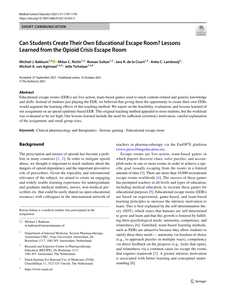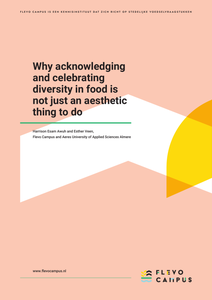It is argued that if we decide to keep a technology or practice if we get at least one positive result from it, we do not have to change anything at all. Even factory farming, and wars, have some positive results... Due to the complexity and all the "smart" devices and apps, we may have started to feel, think and connect less. However, we have definitely not lost these deep-rooted properties of our human nature. We only have to put the devices away, play a board game together, or go for a walk in nature, and our sense of direction returns almost immediately, literally and figuratively. Addiction to our modern substances is broad, but superficial. There is a way back, or rather forward. We have lost nothing, not even our judgment, we know that we should not believe in innovation, but in our own Inner Development
MULTIFILE
Technological developments have a major impact on how we live, work and learn together. Several authors refer to a fourth revolution in which robots and other intelligent systems take over an increasing number of the current (routine) tasks carried out by humans (Brynjolfsson & McAfee, 2014; Est et al., 2015; Ford, 2016; Helbing, 2014; Ross, 2017; Schwab, 2016). The relationship between man and machine will change fundamentally as a result. We are already noticing this shift, most specifically in the workplace. E.g., in the field of health care, digitalisation and robotisation can empower patients and their families. Hospitals are primarily intended for clients with complex care needs. This has consequences for the tasks carried out by nurses, who become more of a ‘care director’ or ‘research nurse’. Hospitals approach this in different ways, resulting in considerable diversity as to how these roles are fulfilled. These changes, albeit diverse, can also be seen in the roles of accountants, police officers and financial advisers at banks (Biemans, Sjoer, Brouwer and Potting, 2017). The traditional occupational profiles no longer exist and the essence of these professions is shifting. This does not make such occupations less attractive, but requires different qualities. The demand for more highly educated professionals who can carry out complex tasks in a creative and interdisciplinary manner will increase (McKinsey, 2017). Also, other social developments, such as migration and greenification, prompt us to ask new questions, resulting in new paths towards identifying solutions.
MULTIFILE

Efforts to create age-friendly cities progressively intersect with goals for environmental sustainability. The older people’s beliefs, behaviours and financial aspects regarding environmental sustainability in their lives are an understudied topic and not well understood. Therefore, a representative survey was conducted using the psychometrically sound and comprehensive SustainABLE-16 Questionnaire. A total of 388 respondents, who were community-dwelling older people in The Hague, filled out the survey completely. Overall, the mean scores on the SustainABLE-16 for finance- and environment-driven pro-environmental behaviours, beliefs and the financial position among older people were positive for all districts of The Hague. Using the outcomes of the survey, a total of six unique typologies were identified through a two-step process combining hierarchical and k-means cluster analyses. These six typologies are 1 the staunch non-believers, 2 the finance-driven non-believers, 3 the everyday individuals, 4 belief-driven people with limited financial resources, 5 believing non-responders, 6 the affluent and engaging people. These six typologies each require different approaches from policymakers. Sustainabilityrelated policies should ideally focus on groups with high scores for pro-environmental behaviours but who have shortcomings in knowledge how to improve one’s everyday lifestyle and groups who lack the necessary financial means to live a more sustainable life.
MULTIFILE

In this article we focus upon a division between generalized schools of philosophical and ethical thought about culture and conservation. There is an ongoing debate playing out over conservation between those who believe conservation threatens community livelihoods and traditional practices, and those who believe conservation is essential to protect nonhuman species from the impact of human development and population growth. We argue for reconciliation between these schools of thought and a cooperative push toward the cultivation of an environmentally-focused perspective that embraces not only social and economic justice but also concern for non-human species. Our goal is to underline the ethics and tangible benefits that may result from combining the cultural data and knowledge of the social sciences with understanding of environmental science and conservation. We highlight instances in which social scientists overlook their own anthropocentric bias in relationship to ecological justice, or justice for all species, in favor of exclusive social justice among people. We focus on the polemical stances of this debate in order to emphasize the importance of a middle road of cooperation that acknowledges the rights of human and nonhuman species, alike. In conclusion, we present an alternative set of ethics and research activities for social scientists concerned with conservation and offer ideas on how to reconcile the conflicting interests of people and the environment. https://doi.org/10.1016/j.biocon.2015.01.030 https://www.linkedin.com/in/helenkopnina/
MULTIFILE

Abstract Educational escape rooms (EERs) are live-action, team-based games used to teach content-related and generic knowledge and skills. Instead of students just playing the EER, we believed that giving them the opportunity to create their own EERs would augment the learning efects of this teaching method. We report on the feasibility, evaluation, and lessons learned of our assignment on an opioid epidemic-based EER. This original teaching method appealed to most students, but the workload was evaluated to be too high. Our lessons learned include the need for sufcient (extrinsic) motivation, careful explanation of the assignment, and small group sizes.
MULTIFILE

It is believed that recognising and celebrating diversity in our foodscapes is the right thing to do. But why, really? What benefits make it paramount for this diversity to be lauded? This question needs answering to add more legitimacy to promoting urban food diversity. In this essay we try to do so by investigating the link between ‘recognition justice’ – the celebration of diversity –and inclusion, and understanding inclusion as vital for (social) sustainability. We use two research projects to demonstrate empirically-based lessons which can be drawn to support the need to recognise and celebrate diversity in our urban foodscape.
DOCUMENT

This research investigates to what extent lecturers at universities of applied sciences do regard differentiated rewards(intended to develop and/or display professionalism)to be fair, and to what extent, and in which form, do these stimulate their willingness to (further) professionalise and/or display professionalism. This was a case study research design, and a factorial survey measurement technique was used to collect data. We argue that lecturers believe it is fair that forms of differentiated rewards are used and applied in order to have them develop and/or display more professionalism. Especially the viewpoints/practices that relate to coordination, consultation, and consideration for personal circumstances have an influence on the justice perceived. This paper contributes to the HRM literature confirming that lecturers appreciate financial stimuli enhancing their professionalism; however, elements such as consultation, respect, coordination, and communication are appreciated even more. It appeals to HRM to design new practices which have more stimulating effect on personal and professional growth in subject-specific knowledge.
DOCUMENT

This research investigates to what extent lecturers at universities of applied sciences do regard differentiated rewards—intended to develop and/or display professionalism—to be fair, and to what extent, and in which form, do these stimulate their willingness to (further) professionalise and/or display professionalism. This was a case study research design, and a factorial survey measurement technique was used to collect data. We argue that lecturers believe it is fair that forms of differentiated rewards are used and applied in order to have them develop and/or display more professionalism. Especially the viewpoints/practices that relate to coordination, consultation, and consideration for personal circumstances have an influence on the justice perceived. This paper contributes to the HRM literature confirming that lecturers appreciate financial stimuli enhancing their professionalism; however, elements such as consultation, respect, coordination, and communication are appreciated even more. It appeals to HRM to design new practices which have more stimulating effect on personal and professional growth in subject-specific knowledge.
DOCUMENT

The online presence of organizations is long gone from being just a web page. Social media have enabled easy and inexpensive interaction between millions of individuals and communities. This has not gone unnoticed by cultural heritage institutes. The question is what all these social media activities bring. Even if an institute knows what it tries to achieve online, the metrics often consist of confusing accumulation of statistics, across several systems and reveal little about online user behaviour, engagement and satisfaction. In the research project Museum Compass a prototype of a social media monitor is developed, which will contain data of current and historic online activities on Facebook, Twitter, YouTube, Foursquare and Flickr of all registered Dutch museums. The first version of this monitor has been developed, and we believe that this is a good moment to discuss – mostly in a practical sense – our general approach and preliminary results.
DOCUMENT
